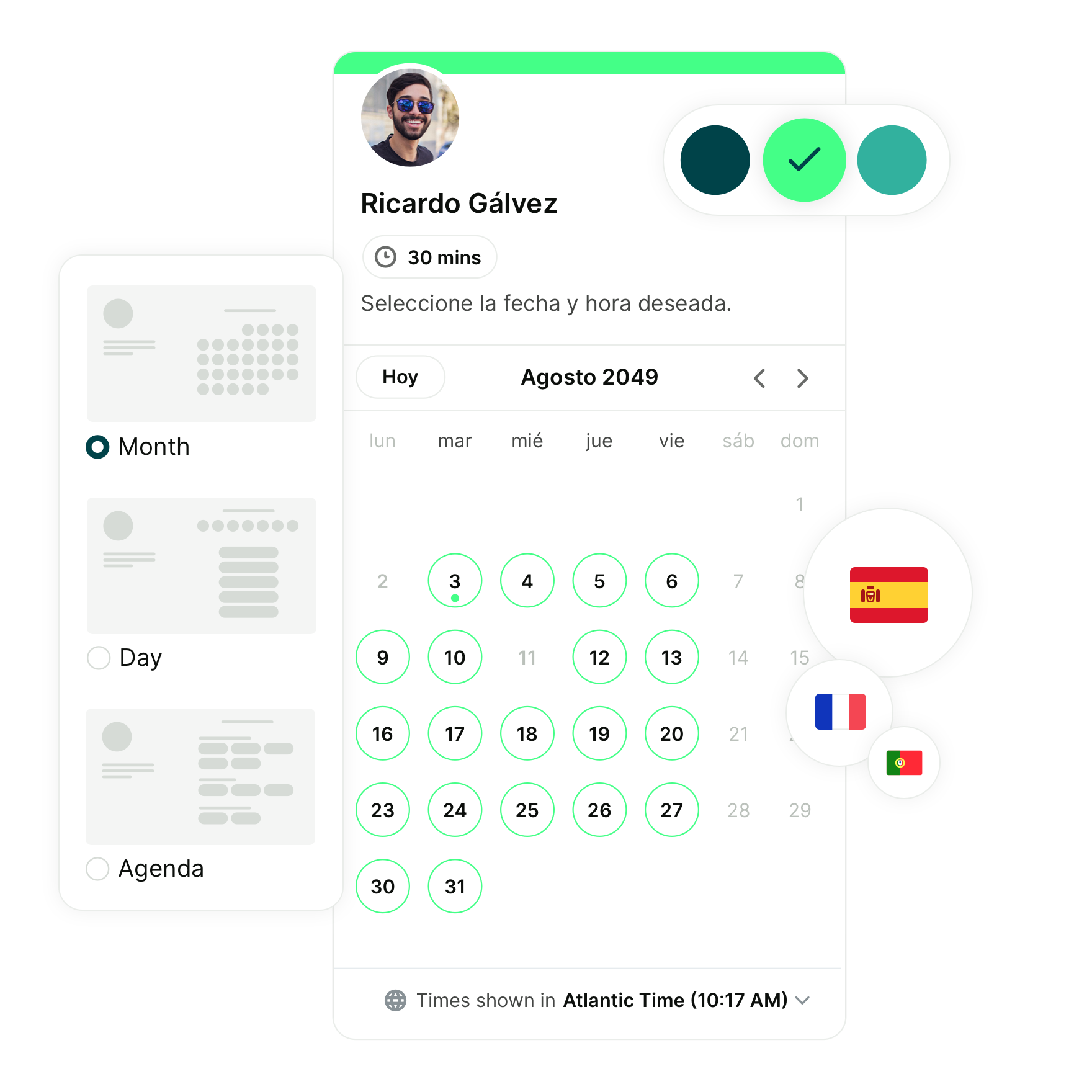How to Create an AI Policy: Template & Tips
AI is powerful, but it needs structure—check out these AI policy template examples to see how businesses are keeping it in check.

Paulina Major

Ready to book more meetings?

Contents
You’ve probably heard of ChatGPT by now. Or Midjourney? Maybe your go-to business software tools have even rolled out some AI features, and you’ve been using them to speed things up, brainstorm ideas, or automate the boring stuff.
We can all agree—these tools are straight-up genius. But they also bring up some serious questions.
What’s okay to use? What’s risky? How do you keep your business protected from AI risks?
Without clear rules, AI can leave your business exposed to security threats, compliance issues, and chaos. That’s why you might want to consider drafting an AI policy—and we’re here to help.
In this guide, you’ll find:
- Tips on creating an effective AI policy
- Scenarios where you may (or may not) need an AI policy
- Three real-world AI policy templates to help you draft your own
Let’s start by defining what an AI policy is.👇
What is an AI policy?
An AI policy is a set of rules and guidelines that outline how AI tools can—and can’t—be used in your business. It helps employees understand where AI fits into their workflows, what’s acceptable, and what’s off-limits.
It can include things like data privacy, i.e., what kind of customer or company data AI tools can process, or approved tools, i.e., which AI tools employees can (or can’t) use on the job.
If your business already has workplace policies—like a privacy policy, social media rules, or customer service policy—adding an AI policy isn’t much different.
But if you’re not using AI yet, you might not need one right away. That said, AI is evolving fast, and having at least a basic policy in place now could save you from scrambling later when AI becomes a bigger part of your business.
How to create an effective AI policy for your small business
Where do you even start with a workplace AI policy?
Well, you could just cross your fingers and hope for the best—but that’s how companies end up in “AI gone wrong” news stories. Like Air Canada which had to pay a passenger damages after its chatbot lied about a bereavement discount.
1. Figure out how AI fits into your business objectives
Before you start setting AI rules, take a step back. How does AI actually help your business?
In 2024, 72% of companies were using AI in at least one part of their operations—whether for automating customer service, generating content, analyzing data, or streamlining workflows. And this number is expected to grow. That said, you should always think about how using AI aligns with what your business is trying to achieve.
Ask yourself:
- What AI tools are we already using (or thinking about)? Are they helping with marketing, operations, HR, or something else?
- What should AI actually do for us? Is it just handling repetitive tasks, or do we want it to help with decision-making?
- Where do we draw the line? Are there areas—like finances, hiring, or sensitive customer data—where AI shouldn’t be involved?
If you don’t set clear expectations, employees might start relying on AI in ways that don’t serve your business (or worse, create risks). Figuring out where AI fits will make the rest of your policy easier to write—and useful.
2. Set clear guidelines on AI usage
Once you know where AI fits into your business, the next step is simple: set some ground rules.
AI is powerful, but without clear guidelines, it can easily go off the rails.
Employees might over-rely on it, feed it sensitive data, or use it for things it wasn’t meant to do. A solid AI policy keeps everything in check.
Here’s what to cover:
- AI-generated content needs a human check: If employees are using AI for writing, design, or decision-making, do they need to review and edit before publishing or acting on it? Make sure AI isn’t just making stuff up (because it definitely can). You can also lean on AI Detector technology to help identify when a human definitely needs to be involved.
- Define what AI can—and can’t—do: Can it handle emails? Brainstorm ideas? Make hiring decisions? Draw a clear line between what’s AI-assisted and what requires a human touch.
- Be careful with customer interactions: If you’re using AI chatbots, are they fully automated, or does a human step in at some point?
- Lock down data security: Employees should never feed sensitive customer data, financial info, or private company details into AI tools. Once it’s out there, you can’t take it back.
3. Ensure AI compliance & ethical use
The ethical and legal considerations of using AI are also important and should be included in your policy. Here’s what to consider:
- Follow data privacy laws: Depending on your location, the AI tools you decide to use may need to comply with GDPR, The Privacy Act in the U.S., or other regulations. Employees should never input confidential or personal data into AI tools.
- Avoid bias and misinformation: AI can reinforce biases or generate false information. Set guidelines for fact-checking AI-generated content and ensuring fair decision-making.
- Respect intellectual property: AI doesn’t “create” from scratch—it pulls from existing data. Make sure employees aren’t unintentionally plagiarizing or violating copyrights.
4. Train your team on AI best practices
AI is a powerful tool, but it’s not a 'set it and forget it' solution. Employees need ongoing training to use it effectively and responsibly. However, according to CybSafe, 52% of employees have yet to receive any training on safe AI use.
Without proper guidance, AI can generate false information, reinforce biases, or even expose sensitive data. Therefore, your AI policy should clearly define how AI can be used. It should also specify when employees must complete training and how that training will be arranged.
5. Monitor AI use & update policies regularly
AI policies (and the training) must be continuously updated to keep pace with rapid technological and regulatory changes. A policy drafted this year will likely be outdated by 2028, making regular revisions essential.
Start with a foundational AI training program covering data security, legal compliance, and ethical AI use. Make it mandatory for new hires as part of your onboarding process and schedule quarterly refreshers to align with evolving tools and regulations.
Also, implement a monitoring system to track AI-generated content, customer interactions, and decision-making processes. If the AI introduces compliance risks, spreads misinformation, or exhibits bias, adjust your policy and training immediately to mitigate potential issues.
Does your small business need an AI policy?
The short answer? It depends.
In the U.S., there’s no legal requirement for businesses to have an AI policy. But the European Union’s AI Act, the world’s first comprehensive AI law, is already setting strict rules for how AI can be used—especially in areas like hiring, finance, and customer data management.
So, while it might not be a requirement, if you do use AI within your business, having a policy is a good idea.
More and more companies are choosing to create an AI policy, not because they have to, but because it helps avoid risks and sets clear expectations for employees. Others simply want to be transparent with their customers.
A couple of scenarios when it’d make sense to have an AI policy for your small business are:
- You’re using AI in hiring: If you've started using an AI tool to screen resumes or rank job applicants, you should be aware that it can inherit biases from the data it's trained on, potentially leading to unfair hiring practices. Implementing a policy ensures clear guidelines and human oversight.
- AI is writing your marketing content: If AI is generating blog posts, product descriptions, or ad copy, there’s a risk of misinformation or even unintentional plagiarism. A policy can require fact-checking and editing before publishing.
- Your team is using AI tools in their work: Without clear guidelines, employees might input sensitive company data into AI chatbots or use unreliable tools for business decisions. A policy sets boundaries on what’s allowed and what’s off-limits.
- You’re in a regulated industry: If your business operates in finance, healthcare, or legal services, AI use could have serious legal and ethical implications. Having a policy keeps you compliant and protected.
Can you use generative AI (like ChatGPT) to write your AI policy?
AI writing an AI policy—sounds like a perfect match, right? Well… not exactly.
Generative AI can help draft a basic policy, but it won’t capture the specific needs, risks, or legal requirements of your business.
You should always consult a lawyer when drawing up workplace policies—especially one involving AI, as the legal landscape is evolving fast. And if you’re in a regulated industry, this is even more critical.
|
📖 While we don't recommend relying on AI to draft your workplace policies, we do have a helpful guide on clever ways to use ChatGPT in your small business. |
Now, let’s explore real-world examples to see how other companies structure their AI policies—and what you can learn from them.
AI policy templates: From real-world examples
eBay’s AI policy template
eBay is a global e-commerce powerhouse, connecting buyers and sellers across a massive online marketplace for everything from electronics to collectibles. Check out their AI policy below 👇

(Source)
What they did well:
Unlike many AI policies that focus on general ethical principles, eBay takes a highly structured, risk-based approach, adapting AI governance depending on its specific use case. They recognize that AI used for flagging suspicious activity carries different risks than AI for internal data processing—and they tailor oversight accordingly.
They also emphasize accountability at every level, requiring compliance from employees, vendors, and AI systems across its entire lifecycle.
Vodafone’s AI policy template
Vodafone is a global telecom giant, providing mobile, broadband, and digital services to millions of customers across Europe, Africa, and beyond.
Their AI policy is called the “Artificial Intelligence Framework.” Let’s unpack the most important aspects of it. 👇
 (Source)
(Source)
What they did well:
Vodafone keeps it straightforward and responsible, making sure AI works for people, not against them. They commit to transparency, meaning customers and employees always know when they’re talking to a bot.
They also take privacy and fairness seriously, using AI to improve services (like chatbots and network optimization) while ensuring decisions aren’t biased or unethical.
On the employee side, Vodafone sees AI as a tool, not a replacement, promising training and support as roles evolve. They also stand up for human rights and inclusivity, making sure AI is used fairly across the board.
Sookio’s AI policy template
Sookio is a communications consultancy based in Cambridge, UK, helping senior leadership teams refine their marketing and communications with an external perspective.
Here’s their AI policy 👇

(Source)
What they did well:
Sookio’s AI policy takes a balanced and transparent approach, focusing on ethical AI use, factual accuracy, and privacy. The company emphasizes quality by fact-checking AI-generated content, protection by following legal developments, and privacy by never inputting sensitive data into AI tools.
They also outline clear internal guidelines, including requiring team members to report AI usage, developing AI training resources, and maintaining human oversight in all content creation.
Wrapping up
If you’re using AI in your business—even for something as small as auto-generating emails or responding to customers—having basic guidelines in place is a good idea.
You don’t need an extensive policy, nor does it have to be perfect. Draft one that fits your business today, and keep updating it as you discover more AI use cases.
AI can save you hours when used wisely, but you know what else does? YouCanBookMe—an online scheduling tool that takes the hassle out of booking meetings.
YouCanBookMe lets people book time with you based on your availability, so you’re not constantly checking your calendar or trying to fit meetings into your day. If scheduling is eating up too much of your time, YouCanBookMe can take it off your plate.
Subscribe to our newsletter
Get productivity tips, news, articles and resources.
Written by
Paulina Major
Paulina grew up wanting to be a commercial pilot, but life steered her toward content writing. With a passion for tech and business, she’s found her calling in helping brands share their stories every day. Her non-negotiable? Morning coffee—because nothing starts without that first sip.


.png?width=1600&height=1200&name=booking_page_style@2x%20(2).png)
